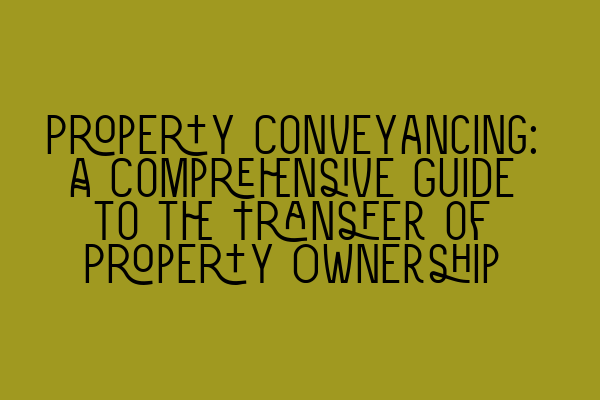Property Conveyancing: A Comprehensive Guide to the Transfer of Property Ownership
Property conveyancing is an essential process in the transfer of property ownership. Whether you are buying or selling a property, understanding the intricacies of conveyancing is crucial to ensure a smooth and legally sound transaction. In this comprehensive guide, we will delve into the various aspects of property conveyancing, providing you with valuable insights and knowledge. So let’s get started!
What is Property Conveyancing?
Property conveyancing refers to the legal process of transferring property ownership from one party to another. It involves a series of steps, from the negotiation of the contract to the completion of the sale. Proper conveyancing ensures that all legal obligations and requirements are met, protecting the interests of both the buyer and the seller.
The Role of a Property Solicitor
A property solicitor plays a crucial role in the conveyancing process. They act as intermediaries, representing the interests of their clients and ensuring that the legal aspects of the transaction are handled correctly. A knowledgeable and experienced property solicitor can guide you through the process, anticipate potential issues, and provide essential advice to protect your rights.
If you are looking for a reliable property solicitor, SQE Property Law & Land Law can provide you with expert legal services. Their team of dedicated solicitors has extensive experience in property conveyancing and can assist you throughout the entire process.
Steps in Property Conveyancing
1. Pre-contract Stage: This stage involves the preparation and negotiation of the contract. The buyer’s solicitor will conduct searches to ensure there are no legal issues affecting the property. They will also investigate the title and review the contract terms. It’s essential to seek professional advice at this stage to safeguard your interests.
2. Exchange of Contracts: Once both parties are satisfied with the contract terms, the contracts are signed, and the deposit is paid by the buyer. At this point, the transaction becomes legally binding, and both parties are obligated to proceed with the sale.
3. Completion: The completion stage involves the finalization of the sale. The outstanding balance is paid by the buyer, and the property ownership is transferred to the new owner. The seller must vacate the property and hand over the keys. The buyer’s solicitor will also register the change in ownership with the Land Registry.
Common Issues in Property Conveyancing
Property conveyancing can sometimes be complex, with various challenges that may arise. It’s crucial to be aware of these potential issues and address them effectively. Some common issues include:
- Chain transactions: A chain transaction occurs when a buyer is also selling a property. Simultaneously coordinating multiple transactions can be challenging and requires careful management.
- Legal restrictions: Some properties may have legal restrictions or covenants that can affect their use or future development. It’s important to identify and address these restrictions during the conveyancing process.
- Unexpected property defects: A buyer may discover undisclosed defects or issues with the property after the exchange of contracts. This can lead to renegotiations or even withdrawal from the transaction.
By working with a skilled property solicitor, these issues can be identified and addressed proactively, avoiding potential complications or legal disputes.
Conclusion
Property conveyancing is a complex process that requires expertise and knowledge to navigate successfully. Choosing a reputable property solicitor, such as SQE Property Law & Land Law, can ensure a smooth and legally sound transaction. By understanding the steps involved and potential issues that may arise, you can confidently navigate the conveyancing process and protect your interests.
For more information on property law and land law or to explore our other services, please visit SQE 1 Practice Exam Questions, SQE 1 Practice Mocks FLK1 FLK2, SQE 2 Preparation Courses, SQE 1 Preparation Courses, or check out the SRA SQE Exam Dates.
